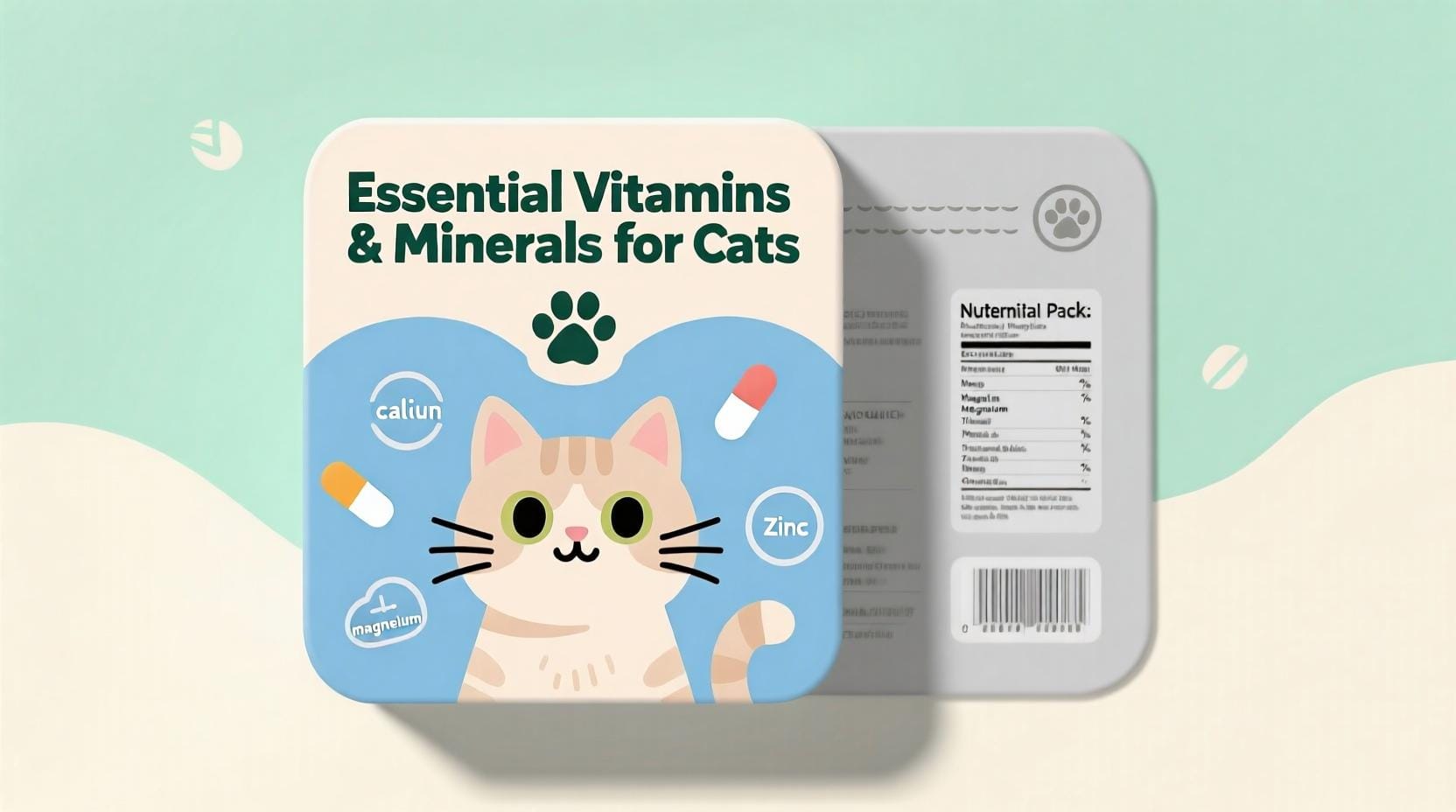
Table of Contents
Did you know your cat’s diet is more than just filling a food bowl? Knowing about cat vitamins and minerals is key to your pet’s health and long life.
Cats are special animals with their own nutritional needs. Unlike other pets, they need a specific mix of nutrients to stay healthy. Vitamins and minerals are crucial for their immune system and muscle function.
Your cat’s diet must have nutrients their body can’t make on its own. Proteins, fats, vitamins, and minerals keep your cat’s energy up and support growth. They also help prevent health problems.
Learning about feline nutrition helps you make better choices for your cat’s diet. This ensures they get the nutrients they need for a happy, healthy life.
Understanding Cat Nutrition Basics
Caring for your cat’s nutritional needs is more than just filling their bowl. Vitamins and minerals are key to their health. Knowing what your cat needs is vital for their well-being.
The Role of Proper Nutrition in Feline Health
Nutrition is the base of your cat’s health. Cats are obligate carnivores, meaning they digest animal proteins better than plants. The right mix of vitamins and minerals helps with:
- Immune system function
- Muscle development
- Coat and skin health
- Organ maintenance
Why Balanced Nutrition Matters for Cats
A balanced diet is key to avoiding health problems. Lack of nutrients can cause serious issues, affecting your cat’s life and health span.
Components of a Healthy Cat Diet
Cats need six main nutrients to stay healthy:
- Protein: Main energy source and muscle builder
- Fat: Gives energy and helps cells work
- Carbohydrates: Adds energy
- Vitamins: Important for body functions
- Minerals: Help with body functions
- Water: Essential for staying hydrated and body functions
Energy is also important, even though it’s not a nutrient. Talking to a vet can help create a diet plan for your cat.
The Importance of Animal Protein for Cats
Your cat’s diet is special. Cats need animal protein because they are obligate carnivores. Knowing how cat vitamins and minerals work in protein is key for their health.
Animal protein is the main building block for your cat’s body. Cats can’t turn plant proteins into the amino acids they need. Their bodies are made to digest meat proteins, which give them the vitamins and minerals they need to live.
“Protein is not just food for cats – it’s a biological necessity.” – Veterinary Nutrition Experts
- Provides essential amino acids
- Supports muscle development
- Enhances immune system function
- Promotes healthy skin and coat
Cats need certain amino acids found only in animal proteins. Taurine is one of these amino acids that cats can’t make on their own. Without enough protein, cats can get very sick.
| Protein Source | Nutritional Value | Amino Acid Profile |
|---|---|---|
| Chicken | High | Complete |
| Fish | Very High | Complete |
| Beef | High | Complete |
When picking cat food, choose high-quality animal proteins. Your vet can guide you to the best protein sources for your cat.
Essential Fat-Soluble Vitamins for Cats
Cat vitamins and minerals are key to your cat’s health. Fat-soluble vitamins are stored in fat and liver. This means they last longer and affect many body functions.
Knowing about these vitamins helps you choose the best food for your cat. Unlike water-soluble vitamins, fat-soluble ones need careful watch to avoid too much.
Vitamin A: Supporting Vision and Immune Health
Vitamin A is vital for your cat’s eyes and immune system. It helps with:
- Seeing well in the dark
- Healthy skin and fur
- Strong immune system
Vitamin D: Building Strong Bones
Vitamin D is called the “sunshine vitamin.” It’s key for absorbing calcium and keeping bones strong. Since cats can’t make it from sunlight like humans, they need it in their food.
Vitamin E: Powerful Antioxidant Protection
Vitamin E is a strong antioxidant. It protects your cat’s cells from damage. It supports:
- A healthy immune system
- Good skin health
- Protection of cell membranes
Vitamin K: Essential for Blood Clotting
Vitamin K is crucial for blood clotting and bone health. It helps your cat heal from injuries and keeps blood healthy.
Always talk to your vet to make sure your cat gets the right vitamins and minerals for health.
Water-Soluble Vitamins in Cat Nutrition
Water-soluble vitamins are key for your cat’s health and how their body works. Unlike fat-soluble vitamins, they dissolve in water and aren’t stored for long. So, your cat needs to get these vitamins regularly to stay healthy.
The B-complex vitamins are important for your cat’s body. They help with many functions. Here are some:
- Vitamin B1 (Thiamine): Supports nervous system health
- Vitamin B3 (Niacin): Helps metabolism and energy production
- Vitamin B6: Crucial for protein metabolism
- Vitamin B12: Supports red blood cell formation
Cats are different when it comes to Vitamin C. Unlike humans, cats can make Vitamin C in their liver. This means they usually don’t need extra Vitamin C. Their body can protect itself without help.
Vets say it’s best to feed your cat a balanced diet. Most cat foods have enough of these vitamins. But, if you’re worried, talk to a vet. They can check if your cat is getting what they need.
Cat Vitamins and Minerals: A Complete Guide
Understanding cat vitamins and minerals is key to your cat’s health. It’s not just about filling their bowl. It’s about giving them a diet that supports their well-being.
Cat vitamins and minerals are vital for your pet’s health. They support bone strength and immune function. The right nutrients can greatly improve your cat’s life.
Primary Mineral Requirements
Cats need certain minerals to thrive. The most important ones are:
- Calcium: Crucial for bone and tooth health
- Phosphorus: Works with calcium for skeletal strength
- Potassium: Supports muscle and nerve function
- Sodium and Chloride: Maintain proper fluid balance
Secondary Mineral Needs
These minerals are also crucial for your cat’s health:
- Magnesium: Supports metabolic processes
- Zinc: Essential for immune function
- Iron: Critical for oxygen transportation
- Copper: Helps form red blood cells
Optimal Mineral Balance
Finding the right mineral balance is an art. Too little or too much can harm your cat. Your vet can help find the perfect diet for your cat.
Nutrition is the foundation of your cat’s health – choose wisely!
Every cat is different. Their needs change based on age, weight, and health. Regular vet visits and a well-planned diet are essential for your cat’s health and happiness.
The Critical Role of Taurine
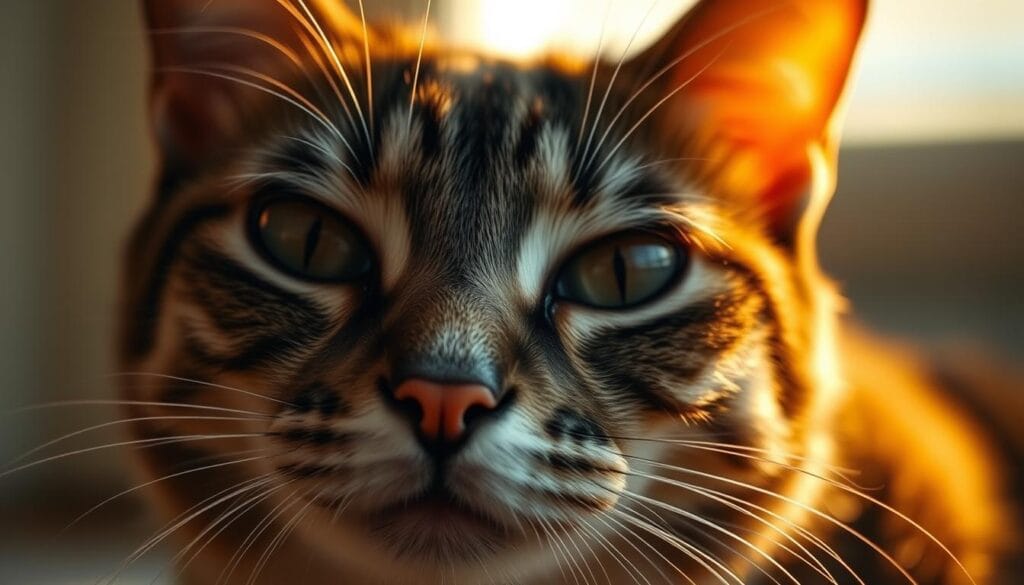
Taurine is a key nutrient in cat vitamins and minerals. Cats can’t make it themselves, so they need it from their food. It’s vital for their health.
Your cat’s body needs taurine for important functions. It helps with heart health, vision, reproductive health, and the immune system. This amino acid is crucial for your cat’s well-being.
- Heart muscle function
- Vision maintenance
- Reproductive health
- Immune system support
Vets say cats need taurine from animal proteins. Meat is the best source of this nutrient. That’s why cats are meat-eaters.
Without enough taurine, cats face serious health problems. Taurine deficiency can cause:
- Dilated cardiomyopathy (heart muscle weakness)
- Retinal degeneration
- Reproductive challenges
It’s important to give your cat enough taurine. Use high-quality protein sources or supplements. This keeps your cat healthy and full of energy.
Essential Fatty Acids for Feline Health
Cat vitamins and minerals are vital for your cat’s health. Essential fatty acids are especially important. Since cats can’t make these nutrients on their own, they must get them from food.
Essential fatty acids come in two main types. They help your cat in different ways. Knowing about these nutrients helps you choose the right food for your cat.
Omega-3 Benefits
Omega-3 fatty acids are very good for cats. They help in many ways, including:
- Reducing inflammation
- Supporting brain function
- Promoting healthy skin and coat
- Enhancing cardiovascular health
Omega-6 Requirements
Omega-6 fatty acids are also crucial. They help with:
- Maintaining skin barrier function
- Supporting growth
- Promoting reproductive health
- Stimulating immune system responses
| Fatty Acid Type | Primary Benefits | Recommended Sources |
|---|---|---|
| Omega-3 | Anti-inflammatory | Fish oil, sardines |
| Omega-6 | Skin health | Chicken fat, corn oil |
Balancing these essential fatty acids is key to supporting your cat’s long-term health and vitality.
Mineral Requirements for Different Life Stages
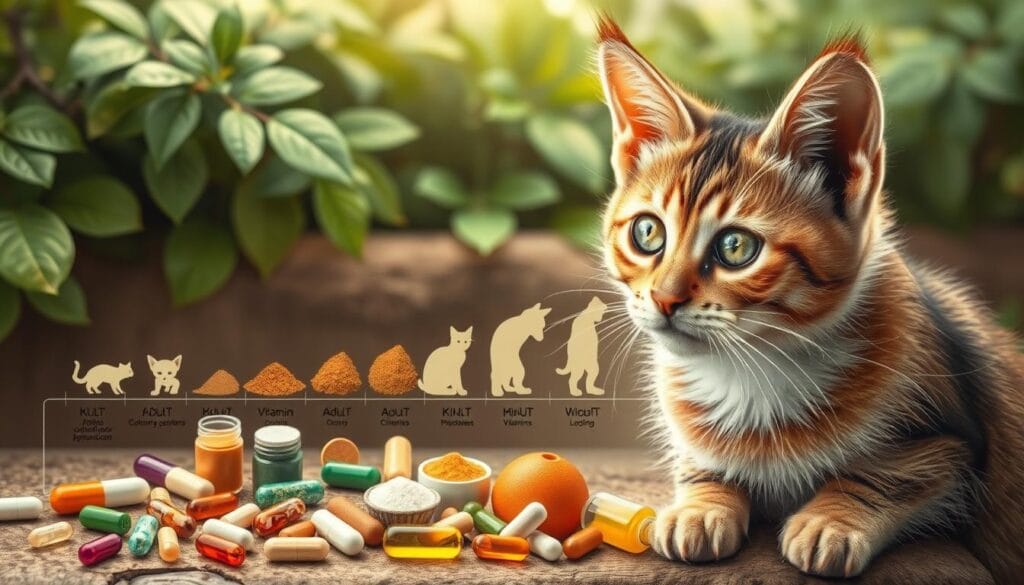
Your cat’s nutritional needs change a lot as it grows. Knowing the right cat vitamins and minerals for each stage is key. This helps you give your cat the best nutrition.
Kittens need special minerals for fast growth. They require more calcium, phosphorus, and other important minerals. These help build strong bones and support their bodies as they grow.
- Kitten Stage (0-1 year):
- Higher protein requirements
- Increased calcium and phosphorus intake
- More frequent feeding schedules
- Adult Cat Stage (1-7 years):
- Balanced mineral maintenance
- Consistent nutrient profile
- Focus on weight management
- Senior Cat Stage (7+ years):
- Reduced calorie needs
- Enhanced mineral absorption support
- Specialized cat vitamins and minerals
Pregnant and nursing cats need extra minerals. Veterinarians suggest more calcium, phosphorus, and protein for them and their kittens. Regular vet visits are important to check their nutritional needs.
By adjusting your cat’s diet based on its life stage, you can meet its mineral needs. This supports its health and energy for years to come.
Signs of Vitamin and Mineral Deficiency
Spotting cat vitamins and minerals deficiencies early is key to keeping your cat healthy. Cats can’t always tell us what they need, so it’s up to us to notice the signs.
Your cat’s body sends out signals when it’s missing important nutrients. Knowing these signs helps you act fast to keep your pet healthy.
Common Deficiency Symptoms
- Coat Quality Changes: Dull, dry, or patchy fur shows a nutritional gap
- Energy Levels: If your cat is always tired or less active, it might need more minerals
- Physical Appearance: Dry skin, brittle nails, and sudden weight changes are red flags
- Behavioral Shifts: If your cat eats less or seems more irritable, it could be a sign of a problem
“A cat’s external appearance often reflects its internal nutritional status.” – Veterinary Nutrition Experts
When to Consult a Veterinarian
If you see many symptoms or if your cat’s health keeps changing, it’s time to see a vet. Vets can do detailed tests and suggest the right treatments.
- Unexplained weight loss
- Continuous digestive issues
- Recurring skin or coat problems
- Significant changes in behavior or energy
Don’t try to figure out or fix vitamin and mineral deficiencies on your own. A vet can make sure your cat gets the right nutrients safely.
Natural Sources of Vitamins and Minerals
Understanding natural food sources is key for your cat’s health. High-quality nutrition comes from choosing the right ingredients. These should come from whole foods.

Animal proteins are vital for cats. They need nutrients from animal sources because their bodies are built for it.
- Chicken: Rich in protein and essential amino acids
- Turkey: Lean meat with balanced nutrient profile
- Beef: Provides iron and zinc
- Fish: Excellent source of omega-3 fatty acids
- Eggs: Complete protein with multiple vitamins
Organ meats are packed with nutrients. Liver, for example, is full of vitamin A, B vitamins, and minerals like iron and copper. These foods help your cat get all the vitamins and minerals they need.
“Nutrition is the foundation of feline wellness” – Veterinary Nutrition Experts
Choose cat food with whole food ingredients. Natural sources are better for your cat. They are easier for your cat to use than synthetic ones.
Supplementation: When Is It Necessary?
Knowing when to give your cat vitamins and minerals is key for their health. Most cats get enough from good commercial food. But, some situations might need extra help.
Vets suggest supplements in certain cases:
- Cats with chronic health conditions
- Senior cats with reduced nutrient absorption
- Pregnant or nursing cats
- Cats recovering from illness or surgery
- Cats with restricted diets
Warning: Never start supplementation without professional guidance. Too many vitamins can hurt your cat more than help.
| Life Stage | Potential Supplementation Need |
|---|---|
| Kitten | Growth-specific nutrient support |
| Adult | Rare, based on individual health |
| Senior | Potential mineral and vitamin support |
Your vet can check if your cat needs extra nutrients. They might do blood tests and health checks. These help find if your cat needs specific supplements.
Safety and Proper Dosage Guidelines
When it comes to cat vitamins and minerals, safety and dosage are key. Your cat’s nutritional needs are very specific. It’s important to know how to give them the right nutrients for their health.
Avoiding Overdose Risks
Too much of cat vitamins and minerals can harm your cat. Vitamins like A, D, E, and K can build up in their body. This can lead to serious health issues.
- Watch for signs of vitamin toxicity
- Consult your veterinarian before starting any supplement regimen
- Stick to recommended daily allowances
Proper Administration Methods
Getting cat vitamins and minerals right is all about precision. Different supplements need different ways to be given. This ensures your cat gets the nutrients they need.
- Use liquid supplements with a dropper for accurate measurement
- Consider chewable tablets for easier consumption
- Mix powdered supplements with wet food
Always prioritize professional veterinary guidance when introducing new supplements to your cat’s diet.
The AAFCO guidelines set standards for cat nutrients. Adult cats need at least 26% crude protein. Kittens and pregnant cats need 30%.
Conclusion
Knowing about cat vitamins and minerals is key for pet owners. Your cat’s diet affects their health, energy, and how long they live. Learning what nutrients your cat needs helps you make choices that keep them healthy from kittenhood to old age.
Vets say a diet made for your cat’s life stage is crucial for health. While many cat foods are good, some cats might need extra vitamins and minerals. This depends on their health, how active they are, and any medical issues.
Working with a vet is very important for your cat’s diet. Regular vet visits and talking about food can help. This way, you can make a diet plan that fits your cat’s needs and keeps them happy and healthy.
Remember, every cat is different. By staying informed and watching your cat’s diet, you can give them the best care. This ensures they live a long, happy life.
Additional sources:
1. Merck Veterinary Manual – “Cat Nutrition”
The Merck Veterinary Manual provides a comprehensive overview of feline nutritional needs, including essential vitamins and minerals, recommended dietary allowances, and deficiency/toxicity signs.
Link: https://www.merckvetmanual.com/cat-owners/cat-nutrition
2. American Association of Feed Control Officials (AAFCO) – Cat Food Nutrient Profiles
AAFCO publishes the official nutrient profiles that commercial cat foods must meet. These tables list minimum and maximum levels for key vitamins and minerals.
Link: https://www.aafco.org/Guidelines/Feed-Nutrient-Profiles
3. World Small Animal Veterinary Association (WSAVA) – Nutrition Guidelines
WSAVA offers global standards for pet nutrition, including cats. Their guidelines explicitly outline the roles and recommended quantities of various nutrients.
Link: https://www.wsava.org/global-guidelines/global-nutrition-guidelines/
4. Veterinary Partner (VIN) – “Feline Vitamins and Minerals”
Veterinary Partner (a member service of VIN) curates veterinarian‑reviewed articles. Their resource on feline vitamins and minerals is practical and written with real‑world applicability for cat owners and clinicians.
Link: https://veterinarypartner.vin.com/default.aspx?pid=19239&id=4951598
FAQ
Why are vitamins and minerals so important for cats?
Vitamins and minerals are key for your cat’s health. They help with immune strength, bone health, vision, and metabolism. Cats need a balanced diet to grow well and stay healthy.
Can cats produce their own Vitamin C?
Yes, cats can make Vitamin C in their liver. They don’t need extra Vitamin C because their bodies can make enough.
What is taurine, and why is it so important for cats?
Taurine is an amino acid cats can’t make themselves. It’s vital for heart health, vision, and reproduction. Cats get taurine from animal proteins, making it crucial for their health.
How do a cat’s nutritional needs change with age?
As cats age, their nutritional needs change. Kittens need more for growth, adults need maintenance, and seniors need support for aging. Pregnancy, activity level, and health issues also affect their needs.
What are the signs of vitamin or mineral deficiency in cats?
Deficiency signs include poor coat, lethargy, weight loss, and vision problems. Behavioral changes can also happen. Always see a vet for a proper diagnosis.
Are vitamin supplements necessary for cats?
Usually, a good cat food has all the needed nutrients. Supplements are only for specific health issues or dietary needs. Always talk to a vet before adding supplements.
What are the most important vitamins for cats?
The key vitamins for cats are A, D, E, and K. They support vision, bones, and blood clotting. B-complex vitamins are also vital for energy and cell function.
How do omega-3 and omega-6 fatty acids benefit cats?
Omega-3 and omega-6 fatty acids are good for skin, coat, and brain health. They reduce inflammation and support cell health. Keeping a balanced ratio is important.
Can cats get all their nutrients from natural food sources?
Yes, cats can get nutrients from animal proteins and organs. Some natural sources are better than others. A varied diet ensures they get all they need.
What are the primary minerals cats need?
Cats need minerals like calcium, phosphorus, and zinc. Each mineral has a special role. Keeping the right balance is key for their health.



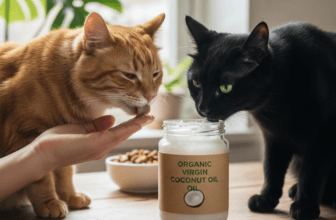
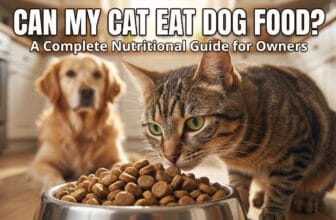



[…] Cats need certain B vitamins for their body to work well. These include: […]